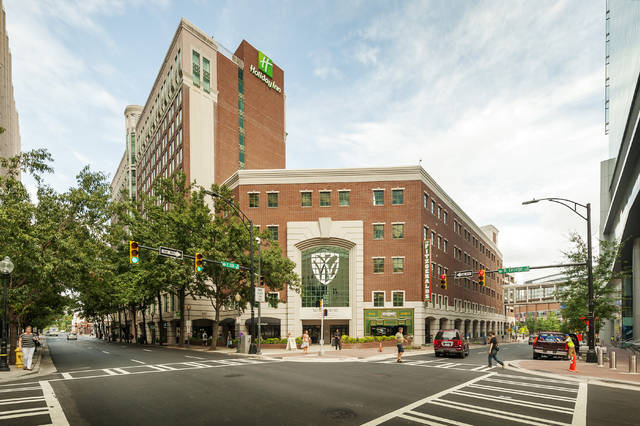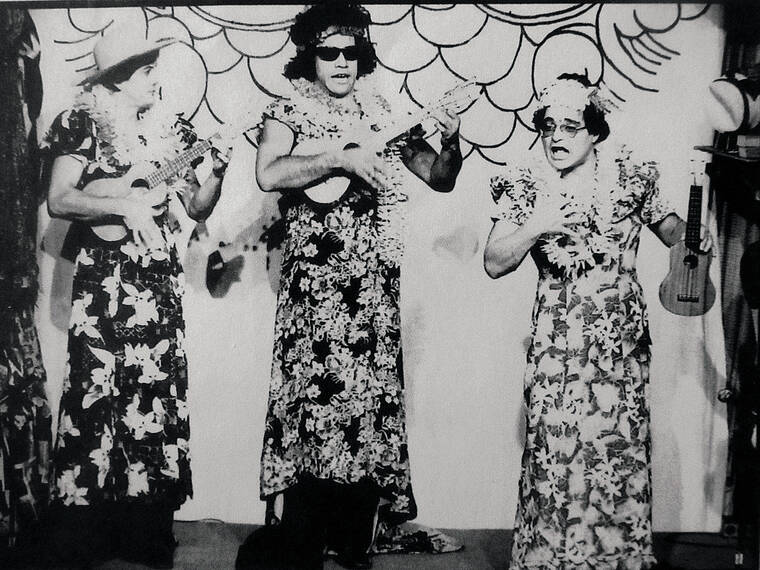Investor Shidler’s gift could bring UH business school $7 billion over time

COURTESY JAY SHIDLER
Wake Forest University Charlotte Center
Wealthy local resident and real estate investor Jay Shidler learned a core lesson over a long career: Hold land and lease it to others. Now he’s sharing that lesson with the University of Hawaii in a valuable way.
A really valuable way.
Like to the tune of possibly $7 billion over the next century.
Shidler has donated a collection of mainland commercial properties to UH, representing the largest single gift ever made to the 110-year-old university.
| LANDMARK DONATION
Real estate investor Jay Shidler has donated seven mainland commercial properties to the University of Hawaii business school already named after him, after donating four similar properties in 2014. The school owns a partial or whole interest in the land under these buildings, and in 99 years will also own the buildings outright or with partners. Don't miss out on what's happening!Stay in touch with breaking news, as it happens, conveniently in your email inbox. It's FREE!
By clicking to sign up, you agree to Star-Advertiser's and Google's Terms of Service Opens in a new tab and Privacy Policy Opens in a new tab. This form is protected by reCAPTCHA.
200 South Michigan 23-story office building in Chicago 200 West Adams 12-story office building in Chicago Burnham Center 21-story office building in Chicago Columbine Place 17-story office building in Denver Continental Plaza 34-story office building in Columbus, Ohio Marriott Fairfield Inn Hotel in Mount Vernon, Ill. Nashville City Center 26-story office building in Nashville, Tenn. National City Tower 40-story office building in Louisville, Ky. Tampa City Center 38-story office building in Tampa, Fla. University of Washington Biomedical Center Research building in Seattle Wake Forest University Charlotte Center Office and hotel complex in Charlotte, N.C. THE GIFT The University of Hawaii Shidler College of Business has been given ownership stakes in 11 mainland office and hotel buildings. Here’s what that’s worth: $2.1 billion Income from leasing the land under the buildings over 99 years $21 million Average ground rent income per year $5.1 billion Estimated value of the properties after 99 years when ownership stakes in the buildings pass to UH
|
Specifically, Shidler, an Oahu resident and UH alumnus, has donated his stakes in the land under 11 office and hotel buildings in nine mainland cities to benefit the business college at UH that already bears his name.
Shidler and UH officials signed gift agreements for seven of the properties Thursday.
Income from ground lease payments, the rent that building owners pay to the landowner, will provide steady and increasing revenue to the business school. This cash flow starts relatively small, between $550,000 and $1.5 million a year for the first 24 years, but over the life of the 99-year ground leases, contractual income to the Shidler College of Business will average $21 million a year and total $2.1 billion.
UH officials said they could use that income stream to eliminate business school tuition within 40 years, along with investing to expand programs, improve facilities and recruit top professors.
What’s more is that after the ground leases expire, UH will own all the buildings either outright or with other partners. At that time, Shidler estimates, UH’s stake would be worth $5.1 billion if the properties only appreciate at the historical annual inflation rate of around 3 percent.
Shidler, 71, said he wanted to make a lasting gift that would allow the college to continue investing in itself and striving for excellence 30 years from now and beyond.
“I know it’s going to take a lot of money,” he said. “This is more than about impacts today.”
Vance Roley, business college dean, said the gift will extend Shidler’s transformational impact on the school, which has risen in national rankings with its Asia-Pacific focus, expanded programs, added endowed faculty positions and increased student scholarships.
“The college, with this gift, is positioned really well for the long run,” he said. “We are incredibly excited for the future.”
Not counting future income from donated real estate, Shidler has made gifts to the business college valued at $228 million since 2006.
It started with a $25 million contribution that year, after which the college was renamed for Shidler. Several additional gifts followed, including a $69 million contribution in 2014, part of which included leased fee interests in four of the 11 office and hotel properties.
The present value of the seven properties just added is $112 million. Shidler also is giving $5 million in cash over the next five years as part of his latest gift.
Grateful alumnus
For Shidler, giving to UH is reciprocation to an institution he credits with helping launch a career in which he has invested in more than 2,000 commercial properties and started more than 20 companies, including five public firms that have been listed on the New York Stock Exchange.
Shidler first moved to Hawaii in 1949 as the child of an Army officer. After moving away and graduating from high school in Maryland, he returned in 1964 and enrolled at UH, where he earned a bachelor’s in business administration four years later.
While at UH, Shidler worked for real estate appraiser Philip Won and one day came across a Makiki property he believed could be developed. Though Shidler explored developing a leasehold condominium on the site as an academic exercise, Won helped make it a reality that today is a 21-story tower called 1111 Wilder.
Shidler used his share of proceeds from that deal to start his own company, The Shidler Group.
Now UH, through the University of Hawaii Foundation, owns 11 Shidler real estate assets. They include three office buildings in Chicago, a hotel in Mount Vernon, Ill., an office tower in Nashville, Tenn., and the tallest building in Louisville, Ky. For seven properties, UH owns a 50 percent interest, which is what Shidler had owned. Three others were owned wholly by Shidler and conveyed entirely to UH, and the stake in the last one is 25 percent.
Gift keeps giving
UH President David Lassner said it would be nice if the university could attract more such gifts. “We would absolutely hope that our grateful alumni and others in the community who we have touched would be inspired by this gift to do what they can to advance higher education in the state,” he said.
Currently, annual UH tuition for resident students is $10,000 a year. The business college has 1,400 undergraduate and graduate students, and the resident tuition is about $13,000 and $21,000, respectively. To make UH free for all its 20,000 students would require covering the estimated $200 million in annual tuition, which would mean a roughly $4 billion endowment invested to produce a 5 percent annual return.
While it likely won’t be $4 billion, Roley anticipates there will be a donation snowball effect because of Shidler’s new gift. He said something similar happened in 2006, and the added gifts along with publicity helped increase the quality of faculty and students.
“Great faculty attracts great students who, in turn, attract great faculty,” Lassner said.
Added Roley, “It’s a good cycle. We’re in that cycle right now.”
Donna Vuchinich, UH Foundation president and CEO, said attracting top faculty with pay secured by endowments is a global competition. “Private investment really positions us to keep the best and brightest, or to attract the best and brightest, that we want for our students,” she said. “That’s a really important piece that private philanthropy and Jay’s gift helped jump-start.”
How exactly business college administrators decide to spend the bulk of future income from Shidler’s real estate donations will be up to a future generation of leaders, though Shidler set one condition that will outlive him. That condition is that UH not sell the real estate assets during their 99-year ground leases.
And after that, Shidler advises holding the real estate. “In 99 years, when ownership of the buildings reverts (to the landowner), the university can sell land and buildings, but I hope they don’t,” he said.




